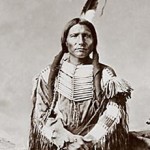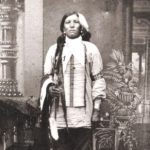 Most people have heard of Crazy Horse, the Lakota Sioux Indian who has been memorialized in the Black Hills. Most of us know that Crazy Horse was a great warrior, but I did not know much about his upbringing. Crazy Horse was born on the Republican River about 1845. Crazy Horse was an uncommonly handsome man, and a man of refinement and grace. He was as modest and courteous as Chief Joseph, but unlike Chief Joseph, Crazy Horse was a born warrior, but a gentle warrior, a true brave, who stood for the highest ideal of the Lakota Sioux people. Of course, you would never hear these things from his enemies, but history should probably judge him more by the accounts of those who knew him…his own people.
Most people have heard of Crazy Horse, the Lakota Sioux Indian who has been memorialized in the Black Hills. Most of us know that Crazy Horse was a great warrior, but I did not know much about his upbringing. Crazy Horse was born on the Republican River about 1845. Crazy Horse was an uncommonly handsome man, and a man of refinement and grace. He was as modest and courteous as Chief Joseph, but unlike Chief Joseph, Crazy Horse was a born warrior, but a gentle warrior, a true brave, who stood for the highest ideal of the Lakota Sioux people. Of course, you would never hear these things from his enemies, but history should probably judge him more by the accounts of those who knew him…his own people.
No matter what Crazy Horse the man was or was thought to be, Crazy Horse, the boy showed great bravery a number of times. In those days, the Sioux prided themselves on the training and development of their sons and daughters, and not a step in that development was overlooked as an excuse to bring the child before the public by giving a feast in its honor. At such times the parents often gave so generously to the needy that they almost impoverished themselves, thus setting an example to the child of self-denial for the general good. His first step alone, the first word spoken, first game killed, the attainment of manhood or womanhood, each was the occasion of a feast and dance in his honor, at which the poor always benefited to the full extent of the parents’ ability. He was carefully brought up according to the tribal customs. I suppose it would have put him in the Indian version of today’s high society.
He was about five years old when the tribe was snowed in one severe winter. They were very short of food, but his father tirelessly hunted for food. The buffalo, their main dependence, were not to be found, but he was out in the storm and cold every day and finally brought in two antelopes. Young Crazy Horse got on his pet pony and rode through the camp, telling the old folks to come to his mother’s teepee for meat. Neither his father nor mother had authorized him to do this, and before they knew it, old men and women were lined up before the teepee home, to receive the meat, in answer to his invitation. As a result, the mother had to distribute nearly all of it, keeping only enough for two meals. On the following day he asked for food. His mother told him that the old folks had taken it all, and added: “Remember, my son, they went home singing praises in your name, not my name or your father’s. You must be brave. You must live up to your reputation.” And so he did.
When he was about twelve he went to look for the ponies with his little brother, whom he loved much, and took a great deal of pains to teach what he had already learned. They came to some wild cherry trees full of ripe fruit. Suddenly, the brothers were startled by the growl and sudden rush of a bear. Young Crazy Horse pushed his brother up into the nearest tree and then jumped upon the back of one of the horses, which was frightened and ran some distance before he could control him. As soon as he could, he turned him about and came back, yelling and swinging his lariat over his head. The bear at first showed fight but finally turned and ran. The old man who told me this story added that young as he was, he had some power, so that even a grizzly did not care to tackle him. I believe it is a fact that a grizzly will dare anything except a bell or a lasso line, so he accidentally hit upon the very thing which would drive him off.
At this period of his life, as was customary with the best young men, he spent much time in prayer and solitude. Just what happened in these days of his fasting in the wilderness and upon the crown of bald buttes, no one will ever know. These things may only be known when one has lived through the battles of life to an honored old age. He was much sought after by his youthful associates, but was noticeably reserved and modest. Yet, in the moment of danger he at once rose above them all…a natural leader! Crazy Horse was a typical Sioux brave, and from the point of view of the white man, an ideal hero.
At the age of sixteen he joined a war party against the Gros Ventres. He was well in the front of the charge,  and at once established his bravery by following closely one of the foremost Sioux warriors, by the name of Hump, drawing the enemy’s fire and circling around their advance guard. Suddenly Hump’s horse was shot from under him, and there was a rush of warriors to kill or capture him while he was down. Amidst a shower of arrows Crazy Horse jumped from his pony, helped his friend into his own saddle, sprang up behind him, and carried him off to safety, although they were hotly pursued by the enemy. Thus, in his first battle he associated himself with the wizard of Indian warfare, and Hump, who was then at the height of his own career. Hump pronounced Crazy Horse the coming warrior of the Teton Sioux. He was killed at Fort Robinson, Nebraska, in 1877, so that he lived barely thirty-three years.
and at once established his bravery by following closely one of the foremost Sioux warriors, by the name of Hump, drawing the enemy’s fire and circling around their advance guard. Suddenly Hump’s horse was shot from under him, and there was a rush of warriors to kill or capture him while he was down. Amidst a shower of arrows Crazy Horse jumped from his pony, helped his friend into his own saddle, sprang up behind him, and carried him off to safety, although they were hotly pursued by the enemy. Thus, in his first battle he associated himself with the wizard of Indian warfare, and Hump, who was then at the height of his own career. Hump pronounced Crazy Horse the coming warrior of the Teton Sioux. He was killed at Fort Robinson, Nebraska, in 1877, so that he lived barely thirty-three years.


One Response to Young Crazy Horse